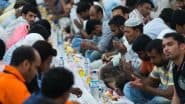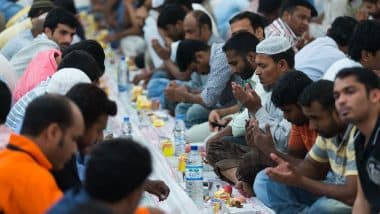Ramadan holds profound significance in Islam as the holiest month of the Islamic lunar calendar. It commemorates the revelation of the Quran to Prophet Muhammad, believed to have occurred during this month. Central to the observance of Ramadan are the rules and guidelines that govern fasting, a fundamental pillar of Islamic practice. These rules, rooted in the teachings of the Quran and the traditions of Prophet Muhammad, outline the obligations and principles that Muslims adhere to during this sacred month. From abstaining from food and drink during daylight hours to engaging in acts of worship and charity, these rules form the framework through which Muslims observe Ramadan, seeking spiritual purification, self-improvement, and closeness to Allah. As you observe Ramadan 2024, we at LatestLY have brought together a list of rules that you must remember to follow for the sacred observation. Know What Is Allowed and Not Allowed During Fasting in the Holy Month of Ramzan
1. Fasting: The primary rule of Ramadan is fasting, which involves abstaining from food, drink, smoking, and other physical needs from dawn (Fajr) until sunset (Maghrib). Fasting is obligatory for all adult Muslims, with exceptions for individuals who are ill, pregnant, nursing, menstruating, travelling, or experiencing other valid reasons for exemption.
2. Intention (Niyyah): Muslims must make a sincere intention to fast each day of Ramadan before dawn. The intention can be made silently within one's heart and is crucial for the fast to be valid.
3. Suhoor and Iftar: Muslims partake in Suhoor, a pre-dawn meal, before beginning their fast, and break their fast with Iftar, the evening meal, at sunset. Suhoor helps provide energy for the day ahead, while Iftar marks the end of the fasting period for the day.
4. Prayer and Quranic Recitation: Ramadan is a time for increased prayer, Quranic recitation, and spiritual reflection. Muslims are encouraged to perform the five daily prayers, attend Taraweeh (extra nightly prayers), and engage in additional acts of worship throughout the month.
Ramadan 2024 Date And Time In India
5. Charity (Zakat and Sadaqah): Giving to charity is an essential aspect of Ramadan. Muslims are encouraged to donate to those in need through Zakat (obligatory almsgiving) and Sadaqah (voluntary charity), demonstrating generosity and compassion towards others.
6. Avoiding Sinful Behaviour: Fasting extends beyond abstaining from food and drink; it also requires abstaining from sinful behaviour such as lying, backbiting, gossiping, and engaging in other prohibited actions. Ramadan is a time for self-discipline, self-reflection, and striving for moral excellence.
7. Seeking Forgiveness and Repentance: Ramadan is an opportunity for Muslims to seek forgiveness for past sins, repent sincerely, and strive for spiritual purification and growth. It is a time to strengthen one's relationship with Allah and seek His mercy and guidance.
By adhering to these important rules and guidelines, Muslims observe Ramadan with devotion, discipline, and spiritual intention, striving to attain the spiritual benefits and blessings associated with this sacred month. Ramadan Mubarak 2024!
(The above story first appeared on LatestLY on Mar 11, 2024 10:34 AM IST. For more news and updates on politics, world, sports, entertainment and lifestyle, log on to our website latestly.com).













 Quickly
Quickly





















